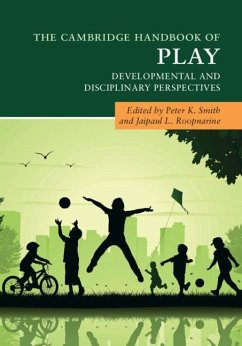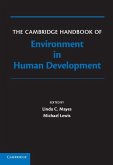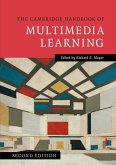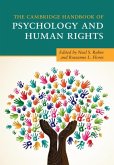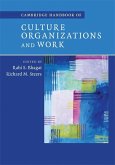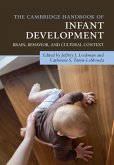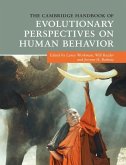Cambridge Handbook of Play (eBook, ePUB)
Developmental and Disciplinary Perspectives
Redaktion: Smith, Peter K.


Alle Infos zum eBook verschenken

Cambridge Handbook of Play (eBook, ePUB)
Developmental and Disciplinary Perspectives
Redaktion: Smith, Peter K.
- Format: ePub
- Merkliste
- Auf die Merkliste
- Bewerten Bewerten
- Teilen
- Produkt teilen
- Produkterinnerung
- Produkterinnerung

Hier können Sie sich einloggen

Bitte loggen Sie sich zunächst in Ihr Kundenkonto ein oder registrieren Sie sich bei bücher.de, um das eBook-Abo tolino select nutzen zu können.
Play takes up much of the time budget of young children, and many animals, but its importance in development remains contested. This comprehensive collection brings together multidisciplinary and developmental perspectives on the forms and functions of play in animals, children in different societies, and through the lifespan. The Cambridge Handbook of Play covers the evolution of play in animals, especially mammals; the development of play from infancy through childhood and into adulthood; historical and anthropological perspectives on play; theories and methodologies; the role of play in…mehr
- Geräte: eReader
- mit Kopierschutz
- eBook Hilfe
- Größe: 6.09MB
- FamilySharing(5)
![Cambridge Handbook of Environment in Human Development (eBook, ePUB) Cambridge Handbook of Environment in Human Development (eBook, ePUB)]() Cambridge Handbook of Environment in Human Development (eBook, ePUB)35,95 €
Cambridge Handbook of Environment in Human Development (eBook, ePUB)35,95 €![Cambridge Handbook of Multimedia Learning (eBook, ePUB) Cambridge Handbook of Multimedia Learning (eBook, ePUB)]() Cambridge Handbook of Multimedia Learning (eBook, ePUB)45,95 €
Cambridge Handbook of Multimedia Learning (eBook, ePUB)45,95 €![Cambridge Handbook of Psychology and Human Rights (eBook, ePUB) Cambridge Handbook of Psychology and Human Rights (eBook, ePUB)]() Cambridge Handbook of Psychology and Human Rights (eBook, ePUB)43,95 €
Cambridge Handbook of Psychology and Human Rights (eBook, ePUB)43,95 €![Cambridge Handbook of Culture, Organizations, and Work (eBook, ePUB) Cambridge Handbook of Culture, Organizations, and Work (eBook, ePUB)]() Cambridge Handbook of Culture, Organizations, and Work (eBook, ePUB)41,95 €
Cambridge Handbook of Culture, Organizations, and Work (eBook, ePUB)41,95 €![Cambridge Handbook of Cultural-Historical Psychology (eBook, ePUB) Cambridge Handbook of Cultural-Historical Psychology (eBook, ePUB)]() Cambridge Handbook of Cultural-Historical Psychology (eBook, ePUB)35,95 €
Cambridge Handbook of Cultural-Historical Psychology (eBook, ePUB)35,95 €![Cambridge Handbook of Infant Development (eBook, ePUB) Cambridge Handbook of Infant Development (eBook, ePUB)]() Cambridge Handbook of Infant Development (eBook, ePUB)58,95 €
Cambridge Handbook of Infant Development (eBook, ePUB)58,95 €![Cambridge Handbook of Evolutionary Perspectives on Human Behavior (eBook, ePUB) Cambridge Handbook of Evolutionary Perspectives on Human Behavior (eBook, ePUB)]() Cambridge Handbook of Evolutionary Perspectives on Human Behavior (eBook, ePUB)39,95 €
Cambridge Handbook of Evolutionary Perspectives on Human Behavior (eBook, ePUB)39,95 €-
-
-
Dieser Download kann aus rechtlichen Gründen nur mit Rechnungsadresse in A, B, BG, CY, CZ, D, DK, EW, E, FIN, F, GR, HR, H, IRL, I, LT, L, LR, M, NL, PL, P, R, S, SLO, SK ausgeliefert werden.
- Produktdetails
- Verlag: Cambridge University Press
- Erscheinungstermin: 15. November 2018
- Englisch
- ISBN-13: 9781108135504
- Artikelnr.: 61304613
- Verlag: Cambridge University Press
- Erscheinungstermin: 15. November 2018
- Englisch
- ISBN-13: 9781108135504
- Artikelnr.: 61304613
- Herstellerkennzeichnung Die Herstellerinformationen sind derzeit nicht verfügbar.
Evolution of Play: 2. New directions in studying the evolution of play
Gordon M. Burghardt and Sergio M. Pellis; 3. The neurochemistry of social
play behaviour in rats Viviana Trezza, E. J. Marijke Achterberg and Louk J.
M. J. Vanderschuren; 4. Fur, fun and future fitness: the evolution of play
in mammals Lynda Sharpe; 5. Nonhuman primate social play: coping with costs
Akie Yanagi and Carol Berman; 6. Evolutionary functions of play: practice,
resilience, innovation, and cooperation Peter Gray; 7. Human-animal play:
play with pets Gail Melson; Part II. Development of Play in Humans: 8.
Infant sensorimotor play: development of socio-cultural competence and
enactive cognition Doris Bergen; 9. Mother-child and father-child play in
different cultural contexts Jaipaul L. Roopnarine, Elif Dede Yildirim and
Kimberly L. Davidson; 10. Object use in childhood: development and possible
functions Tony Pellegrini; 11. Pretend and social pretend play:
complexities, continuities, and controversies of a research field Ageliki
Nicolopoulu; 12. Rough play: past, present and potential Jennifer L. Hart
and Michelle T. Tannock; 13. Playing games with rules in early child care
and beyond Ditte Winther-Lindqvist; 14. Troublesome binaries: playful
learning on screen and off Fiona Scott; 15. Playing and imagining across
the life course: a sociocultural perspective Jennifer A. Vadeboncoeur and
Artin Gönçü; Part III. Historical and Anthropological Context: 16. Play at
play in Western Europe, 1500 and 1800 Linda Pollock; 17. Play in foraging
societies Adam Howell Boyette; 18. Play in South American indigenous
children Yumi Gosso, Briseida D. Resende and Ana M. A. Carvalho; 19. Play
in societies influenced by Confucian values Eunjoo Jung and Sophia Han;
Part IV. Theories of Play and Research Methodology: 20. Classic theories of
play Thomas S. Henricks; 21. Brian Sutton-Smith's views on play Anna
Beresin, Fraser Brown and Michael M. Patte; 22. Methods of studying play
James E. Johnson and Pool Ip Dong; Part V. Play and Learning: 23. Play and
learning in everyday family contexts Marilyn Fleer; 24. Leading children in
their 'leading activity': a Vygotskian approach to play Elena Bodrova,
Deborah J. Leong, Carrie Germeroth and Crystal Day-Hess; 25. The adult as
mediator of development in children's play Pentti Hakkarainen and Milda
Bredikyte; 26. Play, learning and teaching in early childhood education
Niklas Pramling, Anne Kultti and Ingrid Pramling-Samuelson; 27. Toddlers'
play in early childhood education settings Maritta Hännikäinen and Hilkka
Munter; 28. Adult and child learning in playworlds Beth Ferholt, Robert
Lecusay and Monica Nilsson; 29. Play-literacy: knowns and unknowns in a
changing world Kathleen Roskos; 30. The problems of play Susan Engel; Part
VI. Play with Special Groups: 31. Play and children with autism: insights
from research and implications for practice Despina Papoudi and Lila
Kossyvaki; 32. Play and children with sensory impairments P. Margaret Brown
and Anna Bortoli; 33. Play and children with physical impairments Cynthia
J. Cress; 34. A typology of play in medical settings Colleen Baish-Cameron
and Michael M. Patte; 35. Play therapy: theory and practice Elise
Cuschieri; 36. Political violence (war and terrorism) and children's play
Esther Cohen; Part VII. Play Spaces and the Rights of Children: 37. Play
spaces: indoors and out John A. Sutterby; 38. Recess: supporting a culture
of meaningful play at school Lauren McNamara; 39. Playwork: a unique way of
working with children Fraser Brown, Alexandra Long and Mike Wragg; 40. The
right to childhood and the ethos of play Lacey E. Peters and Beth Blue
Swadener.
Evolution of Play: 2. New directions in studying the evolution of play
Gordon M. Burghardt and Sergio M. Pellis; 3. The neurochemistry of social
play behaviour in rats Viviana Trezza, E. J. Marijke Achterberg and Louk J.
M. J. Vanderschuren; 4. Fur, fun and future fitness: the evolution of play
in mammals Lynda Sharpe; 5. Nonhuman primate social play: coping with costs
Akie Yanagi and Carol Berman; 6. Evolutionary functions of play: practice,
resilience, innovation, and cooperation Peter Gray; 7. Human-animal play:
play with pets Gail Melson; Part II. Development of Play in Humans: 8.
Infant sensorimotor play: development of socio-cultural competence and
enactive cognition Doris Bergen; 9. Mother-child and father-child play in
different cultural contexts Jaipaul L. Roopnarine, Elif Dede Yildirim and
Kimberly L. Davidson; 10. Object use in childhood: development and possible
functions Tony Pellegrini; 11. Pretend and social pretend play:
complexities, continuities, and controversies of a research field Ageliki
Nicolopoulu; 12. Rough play: past, present and potential Jennifer L. Hart
and Michelle T. Tannock; 13. Playing games with rules in early child care
and beyond Ditte Winther-Lindqvist; 14. Troublesome binaries: playful
learning on screen and off Fiona Scott; 15. Playing and imagining across
the life course: a sociocultural perspective Jennifer A. Vadeboncoeur and
Artin Gönçü; Part III. Historical and Anthropological Context: 16. Play at
play in Western Europe, 1500 and 1800 Linda Pollock; 17. Play in foraging
societies Adam Howell Boyette; 18. Play in South American indigenous
children Yumi Gosso, Briseida D. Resende and Ana M. A. Carvalho; 19. Play
in societies influenced by Confucian values Eunjoo Jung and Sophia Han;
Part IV. Theories of Play and Research Methodology: 20. Classic theories of
play Thomas S. Henricks; 21. Brian Sutton-Smith's views on play Anna
Beresin, Fraser Brown and Michael M. Patte; 22. Methods of studying play
James E. Johnson and Pool Ip Dong; Part V. Play and Learning: 23. Play and
learning in everyday family contexts Marilyn Fleer; 24. Leading children in
their 'leading activity': a Vygotskian approach to play Elena Bodrova,
Deborah J. Leong, Carrie Germeroth and Crystal Day-Hess; 25. The adult as
mediator of development in children's play Pentti Hakkarainen and Milda
Bredikyte; 26. Play, learning and teaching in early childhood education
Niklas Pramling, Anne Kultti and Ingrid Pramling-Samuelson; 27. Toddlers'
play in early childhood education settings Maritta Hännikäinen and Hilkka
Munter; 28. Adult and child learning in playworlds Beth Ferholt, Robert
Lecusay and Monica Nilsson; 29. Play-literacy: knowns and unknowns in a
changing world Kathleen Roskos; 30. The problems of play Susan Engel; Part
VI. Play with Special Groups: 31. Play and children with autism: insights
from research and implications for practice Despina Papoudi and Lila
Kossyvaki; 32. Play and children with sensory impairments P. Margaret Brown
and Anna Bortoli; 33. Play and children with physical impairments Cynthia
J. Cress; 34. A typology of play in medical settings Colleen Baish-Cameron
and Michael M. Patte; 35. Play therapy: theory and practice Elise
Cuschieri; 36. Political violence (war and terrorism) and children's play
Esther Cohen; Part VII. Play Spaces and the Rights of Children: 37. Play
spaces: indoors and out John A. Sutterby; 38. Recess: supporting a culture
of meaningful play at school Lauren McNamara; 39. Playwork: a unique way of
working with children Fraser Brown, Alexandra Long and Mike Wragg; 40. The
right to childhood and the ethos of play Lacey E. Peters and Beth Blue
Swadener.
